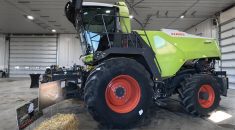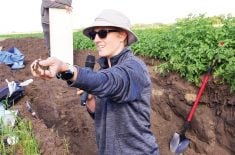SATURNA ISLAND, B.C. – Olive trees growing on the sunny slopes of British Columbia’s Gulf Islands could turn into a unique cottage industry.A three-way partnership started importing olive trees from California last year. The goal is to establish the trees in suitable growing zones for olive oil production.“The oil business in California has just taken off, and that is the focus of olives around the world. We are promoting these as something that can grow here and is unique,” said Michael Pierce, one of the partners.“It sort of fits our Mediterranean style of climate on the Gulf Islands.”The ground does not freeze in winter, snowfall is minimal, summer temperatures are 25 to 30 C and rainfall varies from 500 to 1,000 milli-metres.The partners, which include Pierce, his wife Juliet Kershaw, Mark Timmings, Charlie Burslem and his wife, Nettie Adams, agreed that importing 10 trees from California for their own properties was not worthwhile.They named themselves the Saturna Olive Consortium – Purveyors of Fine Olive Trees on the British Columbia Coast and posted a sign on the local notice board on Saturna Island to see if anyone was interested.They soon started receiving orders, importing 180 three-year-old trees in 2009 and 500 this year.The olive tree is thousands of years old but is suited only to particular climates. It is a good companion plant to vineyards in Italy and California but is not hardy under most Canadian conditions.It needs to face south in well drained soil, which told the importers that there are only a few areas in Canada where it is likely to survive, including the Gulf Islands.“Because they are an evergreen, they wouldn’t grow in the Okanagan because they do not go dormant,” Pierce said.The leaves would drop off and the trees would die if they faced a bad winter.The imported trees have overwintered well on the islands, said Adams, who owns a greenhouse with Burslem in which the newly arrived trees acclimatize and where new seedlings have been started from cuttings.They have found rooting takes patience. The cuttings may sprout, but it is difficult to maintain the roots. However the trees that took root are doing well and appear healthy.“We not only proved it to the people we sold them to but we proved it to ourselves that they are not going to up and die,” Adams said.A Pender Island grower started the first olive grove in Canada seven years ago. He is just starting to harvest enough fruit to press oil.The consortium sold 100 trees that were planted on Saturna Island and more were sent to interested growers on Salt Spring Island.Growing the trees proved easier than importing them from California.The partners had to deal with three levels of government on both sides of the border to ensure no pests were included in the shipment. The Canadian Food Inspection Agency was concerned about a brown snail laying eggs in the dirt, so the trees arrived bare rooted and packed in wet perlite.“Importing trees is not a seamless process. It is quite complex,” Adams said.Added Burslem, who picked up the trees wrapped in plastic and packed into wardrobe boxes: “It requires the phytosanitary regulations from the States and there is a rigamarole getting these things across the border.”The trees look like ornamental Russian olives and should bear fruit in about five years. The imports were Tuscan varieties and produce small green, aromatic flowers.The fruit is harvested in October and turns black as it ripens, but the partners don’t know if Gulf Islands climate will allow the olives to fully ripen.Fruit is first immersed in brine and may be pressed for oil later.The partners have learned customers want them for brining, oil, brewing the leaves for tea or as an ornamental tree on a hobby farm.They warn potential customers the trees need well drained soil, a sunny location and protection from deer. They recommend planting them three to 4 metres apart so there is room for the trees to grow and for workers to set up ladders for harvest.Olives are not invasive and do not sucker.Adams said olive oil production has become big business in California, where consumers have become olive oil aficionados similar to how some people become wine connoisseurs.Pierce said California growers have moved to high-density plantings of 700 to 1,500 plants per acre.The partners do not plan to become orchardists because they do not have enough land but will import and propagate more trees.“We are trying to get at least enough within a close radius to get a critical mass to make sense out of having a cottage industry with this,” Pierce said.The partners are learning as they go and share their knowledge.“Everybody interested in purchasing olives understands the work involved,” Kershaw said.“They know living where we live, and because most of them are in similar environments, you don’t have to explain everything.”They are also continuing to explore the market and foresee the establishment of more orchards as interest grows.“We’ll see where it goes,” Kershaw said.“If bigger groups of people are as passionate as the individuals we talk to on the phone, we’ll see. As long as we are still having fun in talking to people who are so excited about it, that is good.”
Read Also

Soybean market still figuring out implications of China-U.S. pact
Soybean futures had a muted reaction to the U.S. trade deal with China as the market tries to figure out the nuances of the deal.















